How Much Do You Know about British Accents?
How Much Do You Know about British Accents?

The British population is smaller than one-quarter of the population of the United States, and the UK is about one-fortieth of the size of the US in terms of its land area. This being the case, you may be surprised to learn that the UK has many more accents than the US. In fact, British accents in different regions can vary greatly.
Historically, British accents didn’t just indicate which region a person comes from; they also indicated social class. For example, Received Pronunciation (RP) represented the upper-middle class, including the royal family. Estuary English was the representative accent of the middle class in southeast England, and Cockney was considered a very typical accent of the traditional working class in London (particularly East London). RP (also known as the Queen’s English) is still widely regarded as the Standard English accent in the United Kingdom.
Don’t be fooled into thinking that a “London accent” is standard English. In fact, London doesn’t have just one accent! There are many accents that prevail in different areas of London, with Cockney being just one example.
The variety of accents across the whole of the UK is even greater! In central England, around Birmingham, people speak English with a tune-like sound and rounded vowels (the number 5 is pronounced “foive”, for example). This accent is called Brummie. In northwest England, around Liverpool, people generally have an accent called Scouse. One feature of a Scouse accent is to *almost* delete “t” sounds at the end of a statement, making them sound more like a weak “h” sound. For example: “Don’t worry about ih.” John Lennon and George Harrison of The Beatles are good examples of people with Scouse accents. In northeast England, around Newcastle, people speak with an accent called Geordie, which inserts a French-like “r” sounds into words like “plaster” (Geordie: “plarster”) and replaces “ow” sounds with “oo” (so, “toon” instead of “town” and “poond” instead of “pound”). For people unfamiliar with these accents, Scouse and Geordie can be especially hard to understand.
In Wales, people have their own independent language in addition to English. This language is called Welsh. In both speaking and writing, Welsh is very different from English.
In Scotland, the accent sounds very different from the Queen’s English. Different areas of Scotland have different accents. The Glaswegian accent of Glasgow is one well-known example. One characteristic of the Scottish accent in general is that vowel length distinctions are different in Scotland than for other English accents. You may even notice some different vocabulary in Scotland (for example, “wee” means “little”).
No one accent is “better” than another, and it is a thing of the past to divide social classes by accents. At present, there is a trend toward strengthening local accents around the UK. For example, since the 1970s, the BBC has changed its way of broadcasting from only using RP to embracing broadcasters with a variety of accents.
Don’t worry if you have trouble understanding people’s English at first. Even native English speakers can have trouble with some of the UK’s heavier accents. Be patient, and with time, you’ll be able to understand people without any problem!





